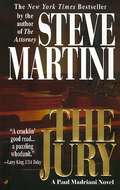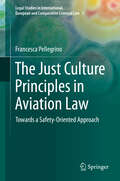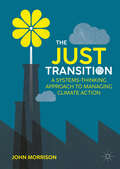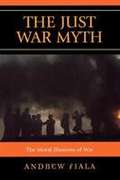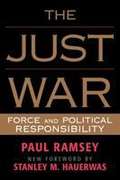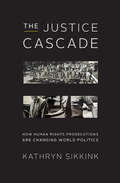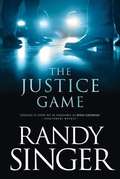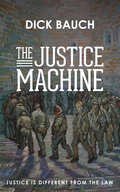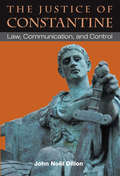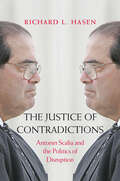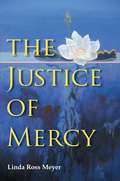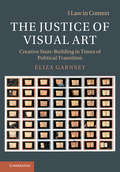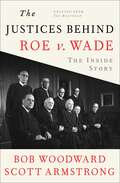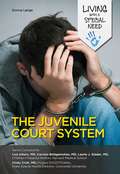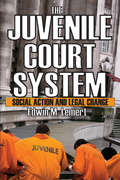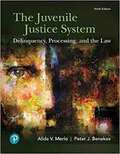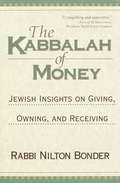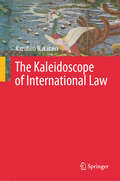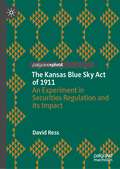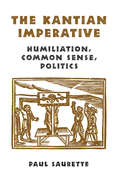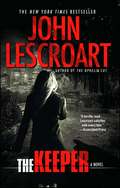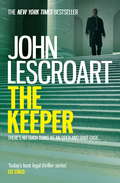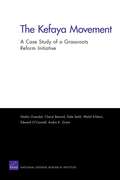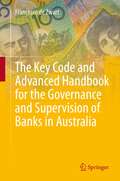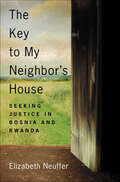- Table View
- List View
The Jury
by Steve MartiniThe Attorney, which marked the return of Steve Martini's lawyer-sleuth Paul Madriani, was hailed for its "well-observed courtroom maneuverings" (The Christian Science Monitor) and "crisp dialogue and tart observations" (Publishers Weekly). Now Martini delivers the most daunting capital case of Madriani's career.Paul Madriani has ample reason to suspect he's representing a guilty man. Dr. David Crone, a respected medical researcher and principal in mapping the human genome, is charged with the murder of a young colleague: twenty-six-year-old Kalista Jordan, an African-American research physician whose body washed up on a beach in San Diego Bay. Forensic evidence links her murder with material in Crone's garage. Crone had both opportunity and motive: Kalista had recently ended their affair, and may have been deserting him professionally as well, moving on to a rival genetic research facility. However, when a key witness for the prosecution dies unexpectedly, leaving an incriminating note behind, Crone's innocence seems confirmed-until Madriani hits upon a potentially damning loose end.
The Just Culture Principles in Aviation Law: Towards a Safety-Oriented Approach (Legal Studies in International, European and Comparative Criminal Law #3)
by Francesca PellegrinoThis book reviews and critically analyzes the current legal framework with regard to a more just culture for the aviation sector. This new culture is intended to protect front-line operators, in particular controllers and pilots, from legal action (except in the case of willful misconduct or gross negligence) by creating suitable laws, regulations and standards. In this regard, it is essential to have an environment in which all incidents are reported, moving away from fears of criminalization. The approach taken until now has been to seek out human errors and identify the individuals responsible. This punitive approach does not solve the problem because frequently the system itself is (also) at fault. Introducing the framework of a just culture could ensure balanced accountability for both individuals and complex organizations responsible for improving safety. Both aviation safety and justice administration would benefit from this carefully established equilibrium.
The Just Transition: A Systems-Thinking Approach To Managing Climate Action
by John MorrisonManaging the climate transition will be one of the biggest challenges ever faced by business and government. While the technical and financial elements of climate transition are vast, the social challenges are even greater. If local populations and workers feel the transitions are not “just” they will resist, and that social opposition now represents one of the greatest barriers to reaching Net Zero by 2050. While the phrase ‘Just Transition’ was in the preamble to the 2015 Paris Climate Agreement, it is only now that business, finance and governments are starting to discuss what this might mean in practice. Thousands of companies are now starting to develop transition plans alongside those of governments. This book shows how all managers can best integrate social elements into these plans, consult with the people most affected by the transition out of the high carbon economy, and ensure that what looks good on paper works in practice. It takes a systems-thinking approach, focusing on the interconnections and interdependence of environmental, social and governance issues. The challenge is immense, and the changes will need to be profound. Each chapter in the book will look at the main domains in which management and policy challenges will be faced. From massively increasing the extraction of rare earth metals, most of which sit below, or adjacent to, indigenous land, to building the infrastructure needed to generate and distribute green energy, possibly over “Not in My Back Yard’ objections, the task of business and government in ensuring that these changes are fair, and perceived as fair, is immense. This book provides the roadmap for how to get there. Managing the social impacts of the climate transition will be one of the biggest challenges ever faced by business and government.
The Just War Myth: The Moral Illusions of War
by Andrew FialaThe Just War Myth argues that while the just war theory is a good theory, actual wars do not live up to its standards. The book provides a genealogy of the just war idea and also turns a critical eye on current events, including the idea of preemptive war, the use of torture, and the unreality of the Bush Doctrine. Fiala warns that pacifism, too, can become mythological, advocating skepticism about attempts to justify war.
The Just War: Force and Political Responsibility
by Paul RamseyRecent conflicts, such as the Persian Gulf War of the 1990s and the war against the Taliban in Afghanistan in 2001 show that the idea of what constitutes a 'just war' remains a crucial issue in politics and ethics today. With a new foreword by noted theologian and ethicist Stanley Hauerwas, this classic text on war and the ethics of modern statecraft written at the height of the Vietnam era in 1968 speaks to a new generation of readers.
The Justice Cascade: How Human Rights Prosecutions Are Changing World Politics (The Norton Series in World Politics)
by Kathryn SikkinkAcclaimed scholar Kathryn Sikkink examines the important and controversial new trend of holding political leaders criminally accountable for human rights violations. Grawemeyer Award winner Kathryn Sikkink offers a landmark argument for human rights prosecutions as a powerful political tool. She shows how, in just three decades, state leaders in Latin America, Europe, and Africa have lost their immunity from any accountability for their human rights violations, becoming the subjects of highly publicized trials resulting in severe consequences. This shift is affecting the behavior of political leaders worldwide and may change the face of global politics as we know it. Drawing on extensive research and illuminating personal experience, Sikkink reveals how the stunning emergence of human rights prosecutions has come about; what effect it has had on democracy, conflict, and repression; and what it means for leaders and citizens everywhere, from Uruguay to the United States. The Justice Cascade is a vital read for anyone interested in the future of world politics and human rights.
The Justice Game
by Randy SingerAfter the target of an investigative report storms a Virginia Beach television station, he kills one of the anchors before the SWAT team takes him down. Following the victim's funeral, her family files a lawsuit against the gun company who manufactured the killer's weapon of choice. The lawyers for the plaintiff and defendant-- Kelly Starling and Jason Noble-- are young, charismatic, and successful. They're also easy blackmail targets, both harboring a personal secret so devastating it could destroy their careers. Millions of dollars-- and more than a few lives-- are at stake. But as Kelly and Jason battle each other, they discover that the real fight is with unseen forces intent on controlling them both.
The Justice Machine
by Dick BauchChas Robertson is driven to steal to survive through a severe drought. His crime is witnessed by a police Aboriginal tracker and he is charged. Suddenly he is accused of attempting to murder the same witness. If Chas cannot convince the jury of his innocence he faces time in Darlinghurst Gaol. Or worse! Based on a true story, The Justice Machine examines the motivations of the players in the law game. The Magistrate, the Policeman, the Prosecutor, the Barrister and the Judge all have their own reasons for being there. Hardly any of them are to do with justice. The law and justice are different things it seems. The year is 1882 but this could be any time. Injustice is timeless.
The Justice of Constantine: Law, Communication, and Control
by John Noël DillonAs the first Christian emperor of Rome, Constantine the Great has long interested those studying the establishment of Christianity. But Constantine is also notable for his ability to control a sprawling empire and effect major changes. The Justice of Constantineexamines Constantine's judicial and administrative legislation and his efforts to maintain control over the imperial bureaucracy, to guarantee the working of Roman justice, and to keep the will of his subjects throughout the Roman Empire. John Dillon first analyzes the record of Constantine's legislation and its relationship to prior legislation. His initial chapters also serve as an introduction to Roman law and administration in later antiquity. Dillon then considers Constantine's public edicts and internal communications about access to law, trials and procedure, corruption, and punishment for administrative abuses. How imperial officials relied on correspondence with Constantine to resolve legal questions is also considered. A study of Constantine's expedited appellate system, to ensure provincial justice, concludes the book. Constantine's constitutions reveal much about the Theodosian Code and the laws included in it. Constantine consistently seeks direct sources of reliable information in order to enforce his will. In official correspondence, meanwhile, Constantine strives to maintain control over his officials through punishment; trusted agents; and the cultivation of accountability, rivalry, and suspicion among them.
The Justice of Contradictions: Antonin Scalia and the Politics of Disruption
by Richard L. Hasen“Superbly written, filled with brilliant insights . . . Both liberals and conservatives will see Scalia and his legacy in a new and more illuminating light.” —Adam Winkler, author of Gunfight: The Battle Over the Right to Bear Arms in AmericaEngaging but caustic and openly ideological, Antonin Scalia was among the most influential justices ever to serve on the United States Supreme Court. In this fascinating new book, legal scholar Richard L. Hasen assesses Scalia’s complex legacy as a conservative legal thinker and disruptive public intellectual.The left saw Scalia as an unscrupulous foe who amplified his judicial role with scathing dissents and outrageous public comments. The right viewed him as a rare principled justice committed to neutral tools of constitutional and statutory interpretation. Hasen provides a more nuanced perspective, demonstrating how Scalia was crucial to reshaping jurisprudence on issues from abortion to gun rights to separation of powers. A jumble of contradictions, Scalia promised neutral tools to legitimize the Supreme Court, but his jurisprudence and confrontational style moved the Court to the right, alienated potential allies, and helped to delegitimize the institution he was trying to save.“Absorbing . . . [a] book that, at least for this reader, shed new light on the law and how it is made, interpreted, and applied.” —Los Angeles Review of Books
The Justice of Mercy
by Linda Ross MeyerHow can granting mercy be just if it gives a criminal less punishment than he "deserves" and treats his case differently from others like it? This ancient question has become central to debates over truth and reconciliation commissions, alternative dispute resolution, and other new forms of restorative justice. The traditional response has been to marginalize mercy and to cast doubt on its ability to coexist with forms of legal justice. Flipping the relationship between justice and mercy, Linda Ross Meyer argues that our rule-bound and harsh system of punishment is deeply flawed and that mercy should be, not the crazy woman in the attic of the law, but the lady of the house. This book articulates a theory of punishment with mercy and illustrates the implications of that theory with legal examples drawn from criminal law doctrine, pardons, mercy in military justice, and fictional narratives of punishment and mercy.
The Justice of Visual Art: Creative State-Building in Times of Political Transition (Law in Context)
by Eliza GarnseyIn the aftermath of mass conflict how is it possible to address violent and traumatic pasts, reconcile divided nations, and strengthen state institutions? This study explores the connections between transitional justice and visual art in order to answer that question. Garnsey argues that art can engage and shape ideas of justice. Art can be an inquiry into, and an alternative experience of, justice. Art embeds justice on different political levels - both local and global. Art becomes a radical form of political participation in times of transition. Arising out of extensive fieldwork at the Constitutional Court of South Africa and the South Africa Pavilion at the Venice Biennale, which included 130 interviews with key decision makers, the book provides the first substantive theoretical framework for understanding transitional justice and visual art, and develops novel conceptions of visual jurisprudence and cultural diplomacy as forms of transitional justice.
The Justices Behind Roe V. Wade: The Inside Story, Adapted from The Brethren
by Bob Woodward Scott ArmstrongA thrilling, behind-the-scenes account of the revolutionary Roe v. Wade Supreme Court ruling.The Justices Behind Roe V. Wade offers a front-row seat to the inner workings of the Supreme Court that led to the monumental Roe v. Wade decision. Spanning from 1969 to 1972, Pulitzer Prize–winning author Bob Woodward and coauthor Scott Armstrong report on the masterful maneuvering and politicking that affected the court&’s decisions and created obstacles for the landmark ruling. Abridged from the #1 bestseller The Brethren, this is an exquisite work of reporting on one of the most important rulings of the United States.
The Juvenile Court System
by Donna LangeWhen young people commit crimes, they often do not know what to expect next. Will they go to prison like an adult? What programs are there to help them? What people will teach them to make better choices next time? How will they be treated in the juvenile court system? As you read the story of Jeremy, a boy who is caught vandalizing his school, you too will learn the answers to these questions. You will discover what laws govern how young people are treated, and find out about the juvenile court system's processes. You'll find out what happens when young people commit crimes--and how they can get back on track.
The Juvenile Court System: Social Action and Legal Change
by Edwin LemertThis volume is based on a detailed analysis of change in the law and in the administration of justice affecting juvenile off enders in California in the fifties and sixties. It addresses how procedural law develops on a long-term basis and under what conditions. It also examines the processes by which revolutionary changes occur in law and the extent to which social change can be directed or controlled by legislation.Social action to revise California's juvenile court law, which had remained little changed since 1915, began in 1958. Subsequently a small group of legal reformers who perceived anomalies in the law and in the underlying philosophy of the court overcame substantial resistance to effect revolutionary revisions of the law. Lemert examines their experience to determine how changes of such magnitude could take place after decades of gradual adaptations in the juvenile courts. His study also looks into the consequences of this change on the court and related agencies of law enforcement.The author sets forth a socio-legal theory of change-a conception of paradigms, normal evolution, and revolution in law. He applies this theory to data, with special attention to the resistance to legal change and the processes by which it gives way to the adaptive process of normal law. Lemert discusses the substantive aspects of juvenile law as it relates to human affect and meaning, touching on the existential elements of justice. Professionals dealing with juveniles, legal scholars, sociologists, and political scientists will find this book, with its emphasis on how to achieve more equitable administration of juvenile justice, has much to contribute to our understanding of the dynamics of social change.
The Juvenile Justice System: Delinquency, Processing, and the Law
by Alida Merlo Peter BenekosThe Juvenile Justice System: Delinquency, Processing, and the Law offers you an in-depth introduction to juvenile justice. It examines how young offenders are viewed, classified and guided. The authors take a critical eye to the stages of juvenile processing and current and historical responses to juvenile justice. They also examine how research has influenced policy. Examples of comparative juvenile justice raise the importance of focusing on reform and treatment. <p><p> The 9th Edition highlights evidence-based programs that have proven effective in preventing delinquency and treating young offenders. It looks at the Sanctuary Model® and trauma-informed care as two new approaches to working with youth.
The Kabbalah of Money: Jewish Insights on Giving, Owning, and Receiving
by Nilton BonderThis book challenges us to take a broad and ethical view of economic behavior, which includes all forms of exchange and human interaction, from how we spend our money to how we fulfill our role as responsible human beings in a global economic framework. Drawing on Jewish ethical teachings, mystical lore, and tales of the Hasidic masters, Bonder explores a wide range of subjects including competition, partnerships, contracts, loans and interest, tipping, and giving gifts.
The Kaleidoscope of International Law
by Kazuhiro NakataniThis book is a collection of updated and enhanced versions of the author's articles published in English over the past 30 years. It covers a wide range of areas and deals with many practical problems of international law which, despite their diplomatic importance, have been neglected by academics. For example, the book explores the applicability of negotiorum gestio to the planetary climate crisis, international legal problems between sovereign wealth fund holders and recipients, and the possibility of using the frozen assets of the Russian Central Bank. Through joint research and discussions with diplomats and government officials, the author came to realise that what really matters in diplomacy is different from what academics are interested in. On the basis of this conviction, he has included here articles which he considers useful not only for the academic study of international law but also for diplomatic practice. This book covers broad areas of international law and also touches on Japanese ideas of international law.
The Kansas Blue Sky Act of 1911: An Experiment in Securities Regulation and its Impact
by David RessThis Palgrave Pivot presents the first in-depth study of the pioneering Kansas Blue Sky Act of 1911, the first effort in American financial history to regulate the sale of securities in the US. Though offering a balanced examination of critiques of the legislation as a barrier to individual liberty, interstate commerce, and economic growth, the author challenges the prevailing view of the Kansas Act as a complete anomaly, instead exploring sensitively what ‘blue sky laws’ can tell us about small-town market values during the nineteenth-century. Drawing on contemporary accounts of rural commerce and popular stereotypes about rural society, the author takes a cultural-historical approach to the politics of regulation and government intervention in the economy. Situating the Blue Sky Act in the broader context of Progressive Era reforms, the author demonstrates how distinctive patterns of commerce and finance in the self-contained, miniature economies of mid-continental rural communities were often at odds with the “caveat emptor” (buyer beware) standard of American law and commerce in larger markets. Instead the author explores how paternalistic assumptions about individual investment decisions led to the creation of the Act, yet how it was doomed to failure in the context of emerging national stock markets, changing attitudes that regarded stock primarily as a vehicle for trade and the market boom of the 1920s. The book also explores how the initial acceptance of the Kansas model in other states and its later rejection provides a lens through which to examine the fluidity of notions of individual liberty during this period of fast economic and social change. This book will be of interest to researchers working in American financial history, as well as legal history and securities law.
The Kantian Imperative: Humiliation, Common Sense, Politics
by Paul SauretteImmanuel Kant's moral philosophy is almost universally understood as the attempt to analyse and defend a morality based on individual autonomy. In The Kantian Imperative, Paul Saurette challenges this interpretation by arguing that Kant's 'imperative' is actually based on a problematic appeal to 'common sense' and that it is premised on, and seeks to further cultivate and intensify, the feeling of humiliation in every moral subject.Discerning the influence of this model on a wide variety of historical and contemporary political thought and philosophy and critical of its implications, Saurette explores its impact on the work of two seminal and contemporary thinkers in particular: Charles Taylor and Jürgen Habermas. Saurette also shows that an analysis of the Kantian imperative allows a better understanding of current political problems such as the U.S. torture scandal at Abu Ghraib in Iraq and broader post-9/11 U.S. foreign policy. The Kantian Imperative thus demonstrates that philosophy and political theory are as relevant to contemporary events as at any other time in history.
The Keeper: A Novel (Dismas Hardy #15)
by John LescroartFrom New York Times bestselling author John Lescroart, “the master of the legal thriller” (Chicago Sun-Times), comes this riveting suspense novel featuring fan-favorite Dismas Hardy and detective Abe Glitsky on the hunt for clues about a missing woman.On the evening before Thanksgiving, Hal Chase, a guard in the San Francisco County Jail, drives to the airport to pick up his stepbrother for the weekend. When they return, Hal’s wife, Katie, has disappeared without a clue. By the time Dismas Hardy hears about this, Katie has been missing for five days and the original Missing Persons case has become a suspected homicide—with Hal as the prime suspect. And the lawyer he wants for his defense is none other than Hardy himself. Hardy calls on his friend, former homicide detective Abe Glitsky, to look into the case, and there proves to be no shortage of possible suspects aside from Hal. As he probes further, Glitsky learns of an incident at the San Francisco jail, where Hal works—only one of many questionable inmate deaths that have taken place there. Then, as more clues surface, Hal is arrested and finds himself an inmate in the very jail where he used to work, a place full of secrets he knows all too well. Against this backdrop of conspiracy and corruption, ambiguous motives and suspicious alibis, an obsessed Glitsky closes in on the elusive truth. As other deaths begin to pile up he realizes, perhaps too late, that the next victim might be himself.
The Keeper: A riveting and complex courtroom thriller (Dismas Hardy)
by John LescroartThere is no such thing as an open and shut case...The Keeper is the fifteenth thriller in the bestselling Dismas Hardy series by master of legal suspense John Lescroart. Perfect for fans of Steve Cavanagh and Michael Connelly.'The courtroom drama king' - Independent When prison guard Hal Chase's wife, Katie, goes missing on Thanksgiving Eve, he quickly becomes the prime suspect. Now it's up to lawyer Dismas Hardy to lead his defence.Chase and Katie's marriage had been fraught with problems. He certainly had motive to want her out of his life. But as Hardy and former homicide detective Abe Glitsky delve deeper into the case, many details seem off, including the death of an inmate in the jail where Chase worked.Amid a backdrop of conspiracy and corruption, Glitsky closes in on the elusive truth. And as the death count rises, he realises the next victim could be him...What readers are saying about The Keeper:'A gripping novel from start to finish''As always, Lescroart keeps you guessing until the very end''Absolutely one of his best. Excellent in every way'
The Kefaya Movement
by Cheryl Benard Edward O'Connell Dale Stahl Nadia Oweidat Walid KildaniKefaya was an indigenous movement for political reform organized in late2004 in opposition to the regime of Egyptian President Hosni Mubarak. Thisexamination of Kefaya's birth, accomplishments, and decline is based on ananalysis of the work of Egyptian scholars and Arabic-language media reports(including online and new media), as well as structured interviews withpersons associated with and observers of Kefaya and the Muslim Brotherhood.
The Key Code and Advanced Handbook for the Governance and Supervision of Banks in Australia
by Francesco de ZwartThis Key Code and Handbook examines the corporate governance and accountability of Major Banks, their directors and executives which were the central focus of bank, Supervisor, Regulator and governmental activity and public scrutiny in 2018 and 2019. This book explores this responsibility focus by providing evidence from the Global Financial Crisis and beyond with both APRA and ASIC investigating illegal conduct, misconduct and conduct which was below the level of community expectations. This book discusses how the Royal Commission into misconduct in the banking and financial services industry has already given rise to a detailed Final Report whose recommendations are still being put into effect. Further, this book uses evidence provided by the large number of Prudential Standards issued by APRA and investigations into the conduct of Major Banks by Regulators. This book explores governance variables – over 1,700 in number and grouped into 159 ‘key groupings’ or separate categories – which are all indexed to 28 governmental, regulatory and supervisory reports and documents to create a governance code and commentary specifically tailored to Australian banks. Each governance variable is modelled on the Stage 1 Relational Approach contained in Enhancing Firm Sustainability Through Governance. Given the huge interest in the governance of banks, Parts 1 and 2 – explaining the Relational Approach - of Stage 1 were recently published in November 2018 and June 2019 in the Australian Journal of Corporate Law. This book is the largest reference book and handbook in publication worldwide containing the structures, mechanisms, processes and protocols – the checks and balances we call ‘governance variables’ – that deeply addresses and explains banking accountability and regulation in Australia.
The Key to My Neighbor's House: Seeking Justice in Bosnia and Rwanda
by Elizabeth NeufferInterviewing war criminals and their victims, Neuffer explains, through the voices of people she follows over the course of a decade, how genocide erodes a nation's social and political environment. Her characters' stories and their competing notions of justice-from searching for the bodies of loved ones, to demanding war crime trials, to seeking bloody revenge-convinces readers that crimes against humanity cannot be resolved by simple talk of forgiveness,or through the more common recourse to forgetfulness.
